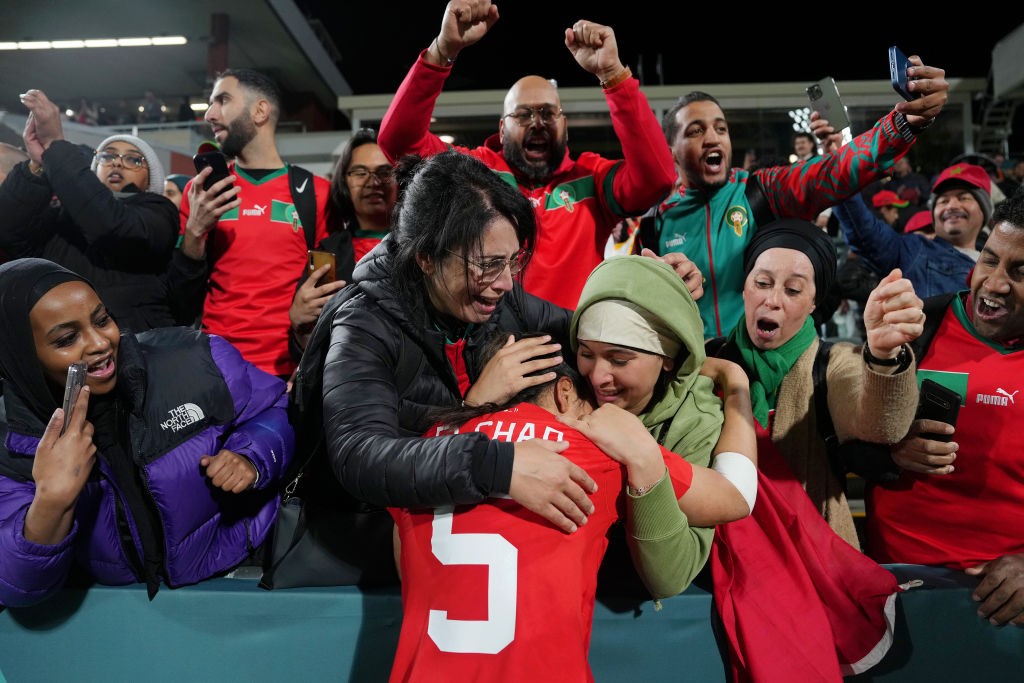August 15, 2023
Learning leadership lessons from the World Cup

Nesryne El Chad of Morocco celebrates with family after advancing to the knockout stage.
The 2023 Women’s World Cup can teach us about the beauty of expanding the table for all, and the ongoing need for equality.
For leaders and those seeking a more liberating vision of life abundant, the 2023 Women’s World Cup teaches us the importance of expanding the table, the power of investing in those who have historically been denied resources, and the pleasure of affirming joy.
In this 2023 World Cup played by women’s national teams, FIFA expanded the field from 24 to 32 nations (up again from 16 prior to 2015). With the 2023 expansion, many mainstream sports pundits tutted that the quality of play would decrease as less-talented teams were invited in. The 2019 World Cup saw major blowouts, like the 13-0 win of the U.S. over Thailand. Instead, the expanded 2023 tournament has seen far closer scorelines. The expanded field has set records for ticket sales and domestic viewership.
While some Americans treat this as a passing event, we experience it as a taste of heaven — a joyous celebration of multicultural life. The World Cup teaches us to get comfortable with the idea that even if it’s not about us, it’s still interesting. Even though the U.S. women’s national team lost in the round of 16, there are still compelling teams for whom to cheer.
The tournament also has lessons for leaders. Instead of clinging to an elitist mindset of limiting seats, we can learn that expanding the table has actually made for a better tournament, more interesting matches and a far more enjoyable experience. With expansion, the world has gotten exposed to young, dynamic talent from across the globe and clashes of styles.
When the table is expanded, we get introduced to brilliant and talented people. The world got a chance to meet the emerging Haitian star Melchie Dumornay and experience her high soccer IQ and skills against an ill-prepared England. Panama’s Marta Cox’s booming free kick against France launched a joyful last game in the group stage that had the group leaders on the edges of their seats.
At 18 years old, Colombia’s young phenom Linda Caicedo is not only the future of women’s football but the present.
With an expanded field of teams also comes increased awareness of the need for equality at the table. Global economic inequality applies to soccer too. First World nations have more economic resources for their teams and better chances of winning the tournament.
There is stark gender inequality as well. FIFA began the men’s World Cup in 1930, while the first Women’s World Cup was allowed only in 1991, 61 years later. The women’s teams have endured chronic underinvestment from their national federations in development, training, research, and physical and mental health support. And as in the church, in the places where we underinvest, sexual, racial, emotional and economic abuse festers.
Almost every team in the tournament has been in conflict with its national federation. After years of pay inequality, the U.S. team just settled the equal pay lawsuit against its federation. Spain’s team quit en masse over a work environment that harmed the players’ emotional and physical well-being. Canada’s team has been in a pay and labor dispute for over a year with its federation. Members of France’s team went on strike over an abusive coach. Some players on Zambia’s team accused their head coach of sexually assaulting his players. The Nigerian team is owed back pay for over two years from its federation. Jamaica’s players were denied training camps, pre-World Cup warmup matches and compensation by their federation and had to crowdfund support to compete in the tournament.
As SkyE’s Shea Butter Football Club podcast co-host, Sylvs, has said, “There is not a talent gap. There is an investment gap.” This is the Pentecostal reality of the Spirit that falls on all people. This tournament shows that all nations have talented players, even as there is unequal investment. Leaders would do well to remember to constantly cast our nets wider and trust that talent is everywhere.
Teams at this tournament show that when there is robust investment, there are also hopeful results. Morocco is a case study in what happens when a federation invests in both its men’s and its women’s teams. As a result of that investment, both have achieved historic success, including the women being the first Arab nation women’s team to make it to the round of 16.
Around the world, investment in women’s domestic leagues has allowed for explosive growth of the sport in home countries while increasing the quality of national teams. In this new landscape, multiple traditional powerhouses have met early exits in this tournament (the U.S., Canada, Germany and Brazil), a sign that the game is growing in a beautiful way. When we invest in development, not just senior leadership, we build strength across generations.
This World Cup teaches us the embodied joy of celebrating, rejoicing, cheering and being alive, especially after such a long, hard season post-COVID. It’s not lost on either of us that in a world that seeks particularly to control Black, queer and women’s bodies, soccer players and fans enact embodied joy. This itself is an act of resistance against powers and principalities.
The communal celebration of fans in the stands rejoicing along with players on the field in being alive feels like church at its best. Many of the Nigerian team’s songs are also worship songs. Colombia and Brazil dance as a team after goals. In the words of the gospel song, “This joy that we have, the world didn’t give it and the world can’t take it away.” Despite remaining inequality, this World Cup gives us an opportunity to cheer.
